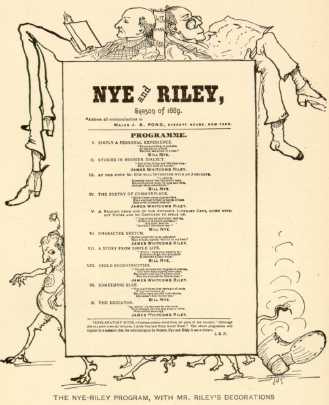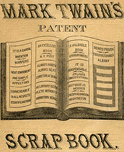
The Nye-Riley combination started in Newark, N.J., November 13, 1888. . . . I ran the show myself in Boston, securing Tremont Temple for the occasion. "Mark Twain" had come to Boston on purpose for the entertainment, as he had never heard these "Twins of Genius." I caught him in the lobby of the Parker House, and told him that he must introduce them. He replied that he believed I was his mortal enemy, and determined that he should never have an evening's enjoyment in my presence. He consented, however, and conducted his brother humorist [Bill Nye] and the Hoosier poet [James Whitcomb Riley] to the platform. Mark's presence was a surprise to the audience, and when they recognized him the demonstration was tremendous. The audience rose in a body, and men and women shouted at the very top of their voices. Handkerchiefs waved, the organist even opened every forte key and pedal in the great organ, and the noise went on unabated for minutes. It took some time for the crowd to get down to listening, but when they did subside, as Mark stepped to the front, the silence was as impressive as the noise had been, as Mark said afterward. At that supreme moment nothing was heard but--silence! I had engaged a stenographer to take down the speech, and this is what Mark said:
"I am very glad indeed to introduce these young people to you, and at the same time get acquainted with them myself. I have seen them more than once, for a moment, but have not had the privilege of knowing them personally as intimately as I wanted to. I saw them first, a great many years ago, when Mr. Barnum had them, and they were just fresh from Siam. The ligature was their best hold then, but literature became their best hold later, when one of them committed an indiscretion, and they had to cut the old bond to accommodate the sheriff. In that old former time this one was Chang, that one was Eng. The sympathy existing between the two was most extraordinary; it was so fine, so strong, so subtle, that what the one ate the other digested, when one slept the other snored, if one sold a thing the other scooped the usufruct. This independent and yet dependent action was observable in all the details of their daily life--I mean this quaint and arbitrary distribution of originating cause and resulting effect between the two: between, I may say, this dynamo and this motor. Not that I mean that the one was always dynamo and the other always motor--or, in other words, that the one was always the creating force, the other always the utilizing force; no, no, for while it is true that within certain well-defined zones of activity the was was always dynamo and the other always motor, within certain other well-defined zones these positions became exactly reversed. For instance, in moral matters Mr. Chang Riley was always dynamo, Mr. Eng Nye was always motor; for while Mr. Chang Riley had a high, in fact an abnormally high and fine, moral sense, he had no machinery to work it within; whereas Mr. Eng Nye, who hadn't any moral sense at all, and hasn't yet, was equipped with all the necessary plant for putting a noble deed through, if he could only get the inspiration on reasonable terms outside. In intellectual matters, on the other hand, Mr. Eng Nye was always dynamo, Mr. Chang Riley was always motor: Mr. Eng Nye had a stately intellect, but couldn't make it go; Mr. Chang Riley hadn't, but could. That is to say, that while Mr. Chang Riley couldn't think things himself, he had a marvellous natural grace in setting them down and weaving them together when his pal furnished the raw material. Thus, working together, they made a strong team; laboring together, they could do miracles; but break the circuit, and both were impotent. It has remained so to this day; they must travel together, conspire together, beguile together, hoe, and plant, and plough, and reap, and sell their public together, or there's no result. I have made this explanation, this analysis, this vivisection, so to speak, in order that you may enjoy these delightful adventurers understandingly. When Mr. Eng Nye's deep, and broad, and limpid philosophies flow by in front of you, refreshing all the regions round about with their gracious floods, you will remember that it isn't his water; it's the other man's, and he is only working the pump. And when Mr. Chang Riley enchants your ear, and soothes your spirit, and touches your heart with the sweet and genuine music of his poetry--as sweet and as genuine as any that his friends, the birds and the bees, make about his other friends, the woods and the flowers--you will remember, while placing justice where justice is due, that it isn't his music, but the other man's--he is only turning the crank.
"I beseech for these visitors a fair field, a single-minded, one-eyed umpire, and a score bulletin barren of goose-eggs if they earn it--and I judge they will and hope they will. Mr. James Whitcomb Chang Riley will now go to the bat."
It was a carnival of fun in every sense of the word. Bostonians will not have another such treat in this generation. It was Mark's last appearance in Boston.


